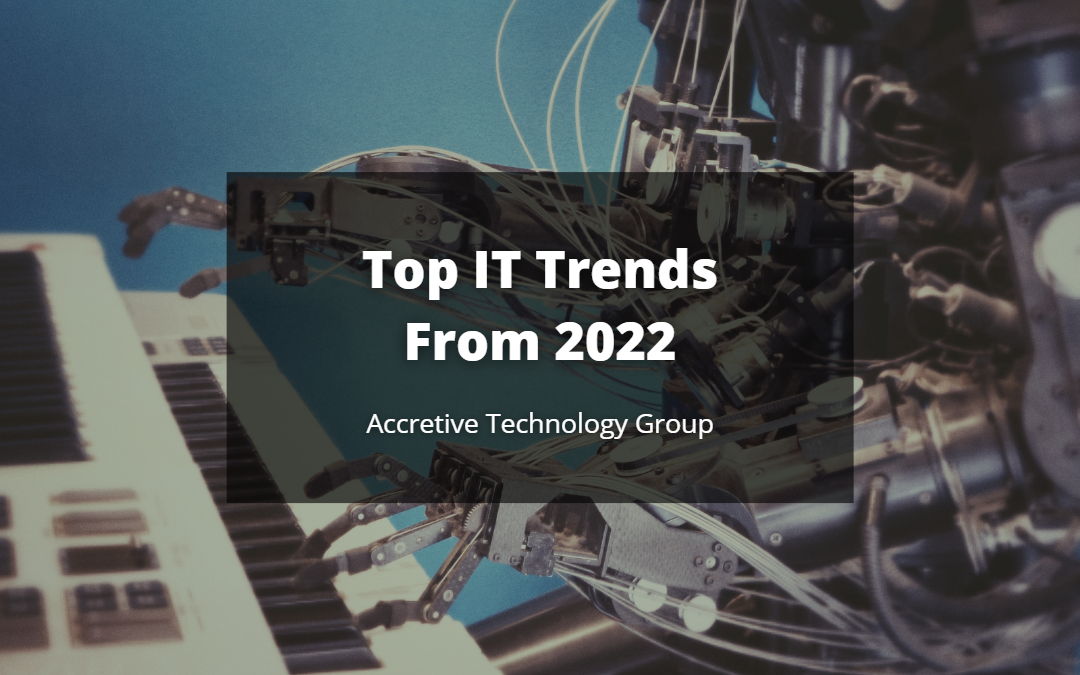In light of the COVID-19 pandemic, the past two years have seen a rapid evolution and adoption of technological advancements. This has resulted in the global digital population reaching five billion strong (over 60% of the world population). As such, the latest technologies and emerging technological trends are of great importance in a digital-dominated world. Check out the top 9 emerging technology trends you should keep tabs on in 2022 to maximize your career growth.
Machine Learning (ML) and Artificial Intelligence (AI)
The global AI market is anticipated to experience unprecedented growth from 2022 to 2029, with a projected Compound Annual Growth Rate (CAGR) of 20.1%. As a result of the global pandemic, the demand for AI has increased significantly in the healthcare industry. Through the use of models and tools, AI has been able to help improve the efficiency and effectiveness of various decision-making processes. In the coming years, there will be a huge demand for skilled individuals in the field of artificial intelligence and machine learning. This will create new jobs in various areas, such as engineering, maintenance, and tech support.
Internet of Things (IoT)
With a global market valuation of over $260 billion in 2021, IoT has become an essential technology for establishing a network of connected devices capable of continuously exchanging data and information in real time. By 2025, we will experience an immense surge in the amount of data related to IoT connections, with the total IoT data amounting to an estimated 79 zettabytes. This will create numerous career opportunities in various fields, including the automobile industry, smart home devices, telecommunications, and wearable fitness devices.
Cybersecurity
With cyberattacks such as AI-enabled phishing and network infiltration having the potential to lead to data or revenue loss, a career in cybersecurity is lucrative yet requires one to stay up-to-date with the rapidly developing technology. Unlike other tech fields, this one has already established a strong presence in the tech world. Around 4 million professionals in the cybersecurity field are currently working in the global workforce. As the information age continues to evolve and more devices connect, this field will remain highly relevant.
Quantum Computing (QC)
Considering its current growth and adoption, the global quantum computing market is expected to reach a valuation of $8 billion by 2027; as of 2020, the industry was estimated to be worth $412 million. QC leverages the laws of quantum mechanics, such as superposition, to solve complex problems, and can be used to answer queries such as how to optimize routes for hundreds of tankers in a global shipping network.
Robotic Process Automation (RPA)
RPA is an enterprise technology that enables organizations to automate various tasks and processes. Although it can be seen as a threat to jobs, as specialized software programs drive the technology, the global revenue from the RPA market is estimated to be over $10 billion by 2023. This creates a sound foundation for knowledge workers to have career prospects such as RPA analysts, developers, and programmers.
Augmented Reality (AR) and Virtual Reality (VR)
AR and VR are expected to bring about revolutionary change in various industries, such as gaming, e-commerce, marketing, and education. Combining the virtual and real world and enhancing 3-D images will provide an advanced and immersive experience. Estimated to generate revenues of $2.4 billion by 2024, the global VR gaming market will see expansion into other industries in the coming years.
Edge Computing
Edge computing is an emerging technology gaining significant business benefits and providing actionable insights. It is becoming an integral part of their operations due to its ability to provide actionable insights and significant business benefits. By bringing enterprise applications and data sources such as IoT devices closer together, it increases the accessibility of data. Moreover, edge computing will accelerate with the rise of IoT devices.
5G
5G technology has received widespread publicity already as the leading mobile broadband tech. Various tech companies such as Apple, Huawei, and Samsung have already started signing up customers for this new generation of wireless. By 2021, the fifth-generation wireless technology, which is currently the most advanced mobile broadband tech, had attracted tech giants such as Samsung, Apple, QualComm, and Huawei and gained considerable publicity. 5G is expected to have around 3 billion subscriptions by 2025, with an already existing active consumer base of over 6.5 billion subscriptions. The potential of 5G is not only useful from a technology perspective but has the potential to benefit people’s careers. With the increased speeds and coverage of 5G, consumers should expect increased mobile data speeds, improved coverage, and other advantages from 5G.
Blockchain
Blockchain technology has quickly become a major market, with its potential and financial interest leading to global spending on blockchain solutions forecasted to reach $19 billion by 2024. Popularly known as an electronic “ledger,” blockchain is a decentralized list of verified and connected records that has taken the world by storm, from Dogecoin to NFTs. Even in its early stages, blockchain has become a significant market.
Due to the technological advancements that have occurred in the past couple of years, it is safe to say that these developments will be even faster and greater in the foreseeable future. In today’s fast-paced business environment, it is important that IT professionals continuously improve their skills to remain relevant, as the demand for trained professionals with the right skill sets will never cease.

